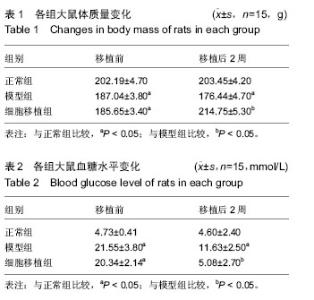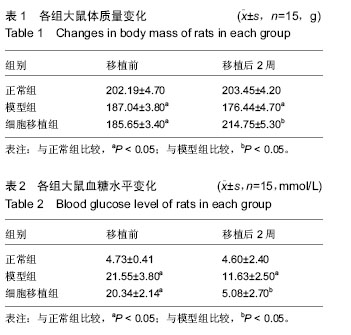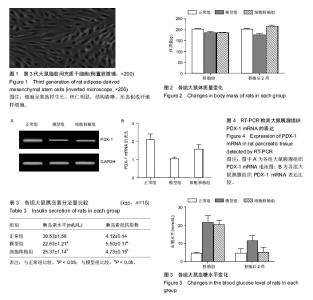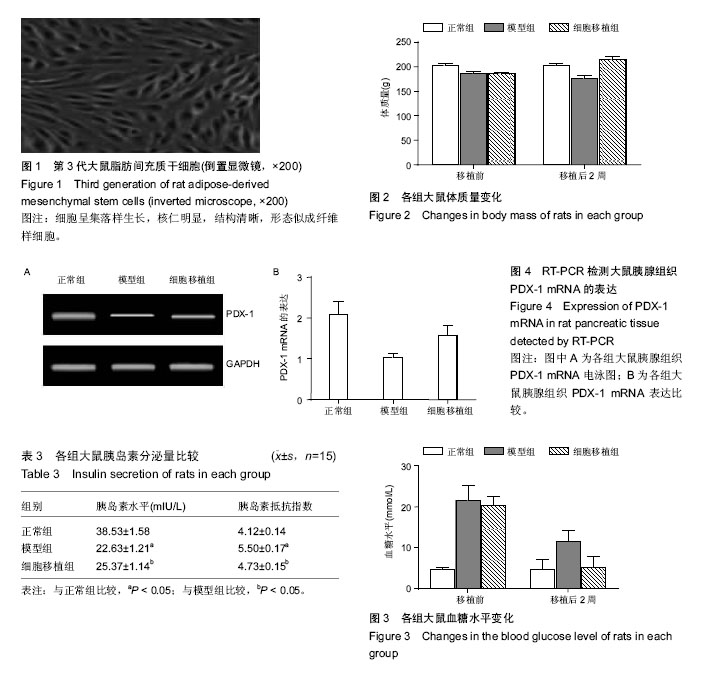Chinese Journal of Tissue Engineering Research ›› 2016, Vol. 20 ›› Issue (41): 6171-6176.doi: 10.3969/j.issn.2095-4344.2016.41.014
Previous Articles Next Articles
Adipose-derived mesenchymal stem cell transplantation for type 1 diabetes in a rat model
Liu Xiao-hui
- Department of Endocrinology, Tianjin Fourth Central Hospital, Tianjin 300140, China
-
Revised:2016-08-08Online:2016-10-07Published:2016-10-07 -
About author:Liu Xiao-hui, Master, Attending physician, Department of Endocrinology, Tianjin Fourth Central Hospital, Tianjin 300140, China
CLC Number:
Cite this article
Liu Xiao-hui . Adipose-derived mesenchymal stem cell transplantation for type 1 diabetes in a rat model[J]. Chinese Journal of Tissue Engineering Research, 2016, 20(41): 6171-6176.
share this article

2.1 脂肪间充质干细胞形态 第3代脂肪间充质干细胞培养两三天后平铺超过瓶底80%以上,细胞呈集落样生长,核仁明显,结构清晰,形态似成纤维样细胞,细胞表面光滑,分布较为均匀,可见明显漩涡状的细胞克隆,杂细胞基本消失,见图1。 2.2 各组大鼠体质量、血糖水平变化 移植前细胞移植组与模型组的体质量均低于正常组,移植后细胞移植组大鼠体质量逐渐增加,而模型组的体质量持续下降,各组大鼠体质量变化见表1,图2。移植前模型组及细胞移植组的空腹血糖均高于正常组,移植后2周,与正常组比较,模型组大鼠空腹血糖维持在较高水平(P < 0.05),与模型组相比,细胞移植组大鼠空腹血糖水平显著下降(P < 0.05)。各组大鼠血糖水平变化见表2,图3。 2.3 各组大鼠胰岛素分泌量比较 与正常组比较,模型组胰岛素水平明显降低(P < 0.05),与模型组比较,细胞移植组胰岛素水平则显著增加(P < 0.05),见表3。 2.4 RT-PCR检测大鼠胰腺组织PDX-1 mRNA的表达 移植后2周,正常组大鼠胰腺组织PDX-1 mRNA表达最高,模型组最低,各组间比较差异有显著性意义(P < 0.05),见图4。"

| [1] 庄前玲,郭桂芳,李湘萍.糖尿病前期的临床研究进展[J].中华护理杂志,2011,46(8):832-833. [2] 崔春萍.中华医学会糖尿病学分会,中国2型糖尿病防治指南(2013)[J].中国糖尿病杂志,2014,22(8):32-42. [3] Antonelli A, Ferrari SM, Giuggioli D, et al. Hepatitis C virus infection and type 1 and type 2 diabetes mellitus.World J Diabetes. 20145;5(5):586-600. [4] 毛佳,杨涛.1型糖尿病发病机制的研究进展[J].江苏医药, 2013,39(3):342-344. [5] 迟毓婧,李晶,管又飞,等.1型糖尿病治疗方法的回顾与展望[J].生理科学进展,2010,41(1):55-58. [6] Lindenmair A, Hatlapatka T, Kollwig G, et al. Mesenchymal stem or stromal cells from amnion and umbilical cord tissue and their potential for clinical applications. Cells. 2012;1(4):1061-1088. [7] 胡泽斌,王立生,崔春萍,等.干细胞临床应用安全性评估报告[J].中国医药生物技术,2013,8(5):349-361. [8] Amable PR, Teixeira MV, Carias RB, et al. Protein synthesis and secretion in human mesenchymal cells derived from bone marrow, adipose tissue and Wharton's jelly. Stem Cell Res Ther. 2014;5(2):53. [9] de Girolamo L, Lucarelli E, Alessandri G, et al. Mesenchymal stem/stromal cells: a new ''cells as drugs'' paradigm. Efficacy and critical aspects in cell therapy. Curr Pharm Des. 2013;19(13):2459-2473. [10] Ma S, Xie N, Li W, et al. Immunobiology of mesenchymal stem cells. Cell Death Differ. 2014;21(2): 216-225. [11] Cuiffo BG, Karnoub AE. Mesenchymal stem cells in tumor development: emerging roles and concepts. Cell Adh Migr. 2012;6(3):220-230. [12] Seino Y, Nanjo K, Tajima N, et al. Report of the committee on the classification and diagnostic criteria of diabetes mellitus. J Diabetes Investig. 2010;1(5): 212-228. [13] American Diabetes Association. Standards of medical care in diabetes--2013. Diabetes Care. 2013;36 Suppl 1:S11-66. [14] American Diabetes Association. Diagnosis and classification of diabetes mellitus.Diabetes Care. 2013; 36 Suppl 1:S67-74. [15] Qiu YH, Deng FY, Li MJ, et al. Identification of novel risk genes associated with type 1 diabetes mellitus using a genome-wide gene-based association analysis. J Diabetes Investig. 2014;5(6):649-656. [16] 陶桂香,徐洋.1型糖尿病发病机制及治疗研究[J].中国免疫学杂志,2015,31(10):1297-1303. [17] ?urawska-Kli? M, Lesman J, Pietrzak I, et al. The impact of having siblings - analysis of "hygiene theory" of chronic diseases in patients with type 1 diabetes in population of the ?ódz region Hygiene theory and type 1 diabetes. Pediatr Endocrinol Diabetes Metab. 2015; 20(3):95-100. [18] de Girolamo L, Lucarelli E, Alessandri G, et al. Mesenchymal stem/stromal cells: a new ''cells as drugs'' paradigm. Efficacy and critical aspects in cell therapy. Curr Pharm Des. 2013;19(13):2459-2473. [19] Bieback K, Brinkmann I. Mesenchymal stromal cells from human perinatal tissues: From biology to cell therapy. World J Stem Cells. 2010;2(4):81-92. [20] Kim N, Cho SG. Clinical applications of mesenchymal stem cells. Korean J Intern Med. 2013;28(4):387-402. [21] 李建鑫,杨亮,王文良.脂肪间充质干细胞在组织工程中的应用[J].中国组织工程研究与临床康复,2010,14(7): 1274-1277. [22] 殷莉波,赵文秀,尹震宇,等.人脂肪间充质干细胞的分离培养及其鉴定[J].中国组织工程研究与临床康复,2010, 14(32):5997-6000. [23] Al-Nbaheen M, Vishnubalaji R, Ali D, et al. Human stromal (mesenchymal) stem cells from bone marrow, adipose tissue and skin exhibit differences in molecular phenotype and differentiation potential. Stem Cell Rev. 2013;9(1):32-43. [24] van Dijk PR, Logtenberg SJ, Hendriks SH, et al. Intraperitoneal versus subcutaneous insulin therapy in the treatment of type 1 diabetes mellitus. Neth J Med. 2015;73(9):399-409. [25] Sena CM, Bento CF, Pereira P, et al. Diabetes mellitus: new challenges and innovative therapies. EPMA J. 2010;1(1):138-163. [26] Ramirez L, Hamad AR. From non-obese diabetic to Network for the Pancreatic Organ Donor with Diabetes: New heights in type 1 diabetes research. World J Diabetes. 2015;6(16):1309-1311. [27] Holditch SJ, Terzic A, Ikeda Y. Concise review: pluripotent stem cell-based regenerative applications for failing β-cell function. Stem Cells Transl Med. 2014;3(5):653-661. [28] Minami K, Doi R, Kawaguchi Y, et al. In vitro generation of insulin-secreting cells from human pancreatic exocrine cells. J Diabetes Investig. 2011; 2(4):271-275. [29] Shimoda M, Chen S, Noguchi H, et al. A new method for generating insulin-secreting cells from human pancreatic epithelial cells after islet isolation transformed by NeuroD1. Hum Gene Ther Methods. 2014;25(3):206-219. [30] Hecking M, Werzowa J, Haidinger M, et al. Novel views on new-onset diabetes after transplantation: development, prevention and treatment. Nephrol Dial Transplant. 2013;28(3):550-566. [31] O'Sullivan ES, Vegas A, Anderson DG, et al. Islets transplanted in immunoisolation devices: a review of the progress and the challenges that remain. Endocr Rev. 2011;32(6):827-844. [32] Guo T, Hebrok M. Stem cells to pancreatic beta-cells: new sources for diabetes cell therapy. Endocr Rev. 2009;30(3):214-227. [33] Sordi V, Piemonti L. Mesenchymal stem cells as feeder cells for pancreatic islet transplants. Rev Diabet Stud. 2010;7(2):132-143. [34] 陈海鸥,胡小宣,刘洪娟,等.脐血干细胞移植治疗肝硬化的疗效观察[J].肝脏,2010,15(2):81-83. [35] Fiorina P, Voltarelli J, Zavazava N. Immunological applications of stem cells in type 1 diabetes. Endocr Rev. 2011;32(6):725-754. [36] Chhabra P, Brayman KL. Stem cell therapy to cure type 1 diabetes: from hype to hope. Stem Cells Transl Med. 2013;2(5):328-336. [37] Bruni A, Gala-Lopez B, Pepper AR, et al. Islet cell transplantation for the treatment of type 1 diabetes: recent advances and future challenges. Diabetes Metab Syndr Obes. 2014;7:211-223. [38] 楚元奎,曹晖,王赟,等.胎猪胰腺干细胞体外诱导分化为胰岛素分泌细胞及其移植治疗裸鼠糖尿病的研究[J].农业生物技术学报,2011,19(1):9-17. [39] 陈国昌,王熙然.干细胞移植治疗糖尿病的国内外研究趋势分析[J].中国组织工程研究,2012,16(36):6834-3840. [40] 王广宇,朱旅云,马利成,等.干细胞移植治疗糖尿病足[J].中国组织工程研究,2013,17(1):173-180. |
| [1] | Zhang Tongtong, Wang Zhonghua, Wen Jie, Song Yuxin, Liu Lin. Application of three-dimensional printing model in surgical resection and reconstruction of cervical tumor [J]. Chinese Journal of Tissue Engineering Research, 2021, 25(9): 1335-1339. |
| [2] | Zeng Yanhua, Hao Yanlei. In vitro culture and purification of Schwann cells: a systematic review [J]. Chinese Journal of Tissue Engineering Research, 2021, 25(7): 1135-1141. |
| [3] | Xu Dongzi, Zhang Ting, Ouyang Zhaolian. The global competitive situation of cardiac tissue engineering based on patent analysis [J]. Chinese Journal of Tissue Engineering Research, 2021, 25(5): 807-812. |
| [4] | Wu Zijian, Hu Zhaoduan, Xie Youqiong, Wang Feng, Li Jia, Li Bocun, Cai Guowei, Peng Rui. Three-dimensional printing technology and bone tissue engineering research: literature metrology and visual analysis of research hotspots [J]. Chinese Journal of Tissue Engineering Research, 2021, 25(4): 564-569. |
| [5] | Chang Wenliao, Zhao Jie, Sun Xiaoliang, Wang Kun, Wu Guofeng, Zhou Jian, Li Shuxiang, Sun Han. Material selection, theoretical design and biomimetic function of artificial periosteum [J]. Chinese Journal of Tissue Engineering Research, 2021, 25(4): 600-606. |
| [6] | Liu Fei, Cui Yutao, Liu He. Advantages and problems of local antibiotic delivery system in the treatment of osteomyelitis [J]. Chinese Journal of Tissue Engineering Research, 2021, 25(4): 614-620. |
| [7] | Li Xiaozhuang, Duan Hao, Wang Weizhou, Tang Zhihong, Wang Yanghao, He Fei. Application of bone tissue engineering materials in the treatment of bone defect diseases in vivo [J]. Chinese Journal of Tissue Engineering Research, 2021, 25(4): 626-631. |
| [8] | Zhang Zhenkun, Li Zhe, Li Ya, Wang Yingying, Wang Yaping, Zhou Xinkui, Ma Shanshan, Guan Fangxia. Application of alginate based hydrogels/dressings in wound healing: sustained, dynamic and sequential release [J]. Chinese Journal of Tissue Engineering Research, 2021, 25(4): 638-643. |
| [9] | Chen Jiana, Qiu Yanling, Nie Minhai, Liu Xuqian. Tissue engineering scaffolds in repairing oral and maxillofacial soft tissue defects [J]. Chinese Journal of Tissue Engineering Research, 2021, 25(4): 644-650. |
| [10] | Xing Hao, Zhang Yonghong, Wang Dong. Advantages and disadvantages of repairing large-segment bone defect [J]. Chinese Journal of Tissue Engineering Research, 2021, 25(3): 426-430. |
| [11] | Chen Siqi, Xian Debin, Xu Rongsheng, Qin Zhongjie, Zhang Lei, Xia Delin. Effects of bone marrow mesenchymal stem cells and human umbilical vein endothelial cells combined with hydroxyapatite-tricalcium phosphate scaffolds on early angiogenesis in skull defect repair in rats [J]. Chinese Journal of Tissue Engineering Research, 2021, 25(22): 3458-3465. |
| [12] | Wang Hao, Chen Mingxue, Li Junkang, Luo Xujiang, Peng Liqing, Li Huo, Huang Bo, Tian Guangzhao, Liu Shuyun, Sui Xiang, Huang Jingxiang, Guo Quanyi, Lu Xiaobo. Decellularized porcine skin matrix for tissue-engineered meniscus scaffold [J]. Chinese Journal of Tissue Engineering Research, 2021, 25(22): 3473-3478. |
| [13] | Mo Jianling, He Shaoru, Feng Bowen, Jian Minqiao, Zhang Xiaohui, Liu Caisheng, Liang Yijing, Liu Yumei, Chen Liang, Zhou Haiyu, Liu Yanhui. Forming prevascularized cell sheets and the expression of angiogenesis-related factors [J]. Chinese Journal of Tissue Engineering Research, 2021, 25(22): 3479-3486. |
| [14] | Liu Chang, Li Datong, Liu Yuan, Kong Lingbo, Guo Rui, Yang Lixue, Hao Dingjun, He Baorong. Poor efficacy after vertebral augmentation surgery of acute symptomatic thoracolumbar osteoporotic compression fracture: relationship with bone cement, bone mineral density, and adjacent fractures [J]. Chinese Journal of Tissue Engineering Research, 2021, 25(22): 3510-3516. |
| [15] | Liu Liyong, Zhou Lei. Research and development status and development trend of hydrogel in tissue engineering based on patent information [J]. Chinese Journal of Tissue Engineering Research, 2021, 25(22): 3527-3533. |
| Viewed | ||||||
|
Full text |
|
|||||
|
Abstract |
|
|||||

